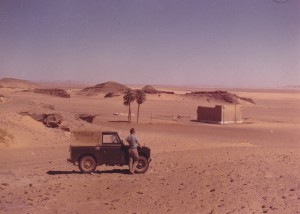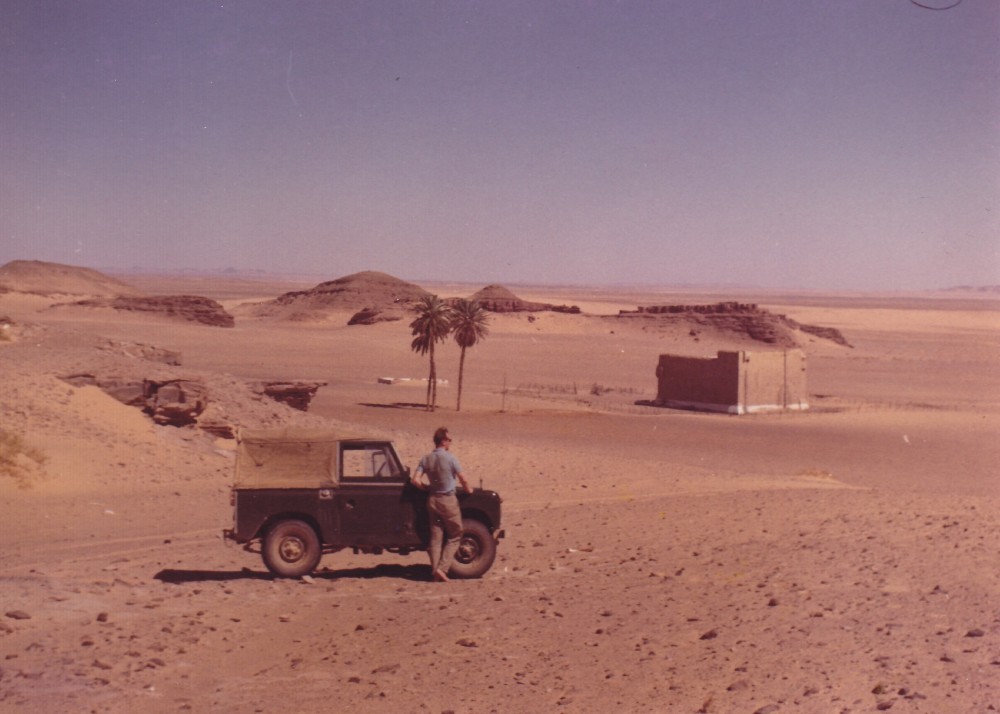Interlude in a Sandstorm by William Fullerton

Forty years ago I had the good fortune to have the chance to travel by Land Rover from Beirut to Jedda. The vehicle was my own and I was going to take up a posting as Information Officer, a title I soon adjusted to the grander sounding one of Press and Cultural Attaché, at the Embassy.
I had just finished the Higher Arabic Course at Mecas and was to share a house in Jedda with a Chancery colleague, Christopher Long, a seriously good Arabist, who had graduated from a previous Mecas course and was now already en poste. Christopher had flown up from Jedda to join me on the journey down. As a bachelor, and one going to a house already set up, I travelled light with just a couple of suitcases and the vehicle which must have been an administrative officer’s dream of a new arrival.
In those days there was a stretch of sand desert for about fifty miles between Jordan and Saudi Arabia with no made up road. Our journey to the frontier went well apart from refusal on the part of a Jordanian official to let us pass Mudawwarah, the last village in Jordan, whether we had a Saudi letter or not and never mind any diplomatic visas.
This meant a delay of a couple of days while messages were telegraphed back and forth between us and the British Embassy in Amman and various authorities. Fortunately we came across a company attempting to restore the Hejaz Railway with a tempestuous Welshman in charge who put us in an air conditioned cabin while we waited. I have always much enjoyed the varied desert scenery round the Wadi Rum and Mudawwarah, and the Hejaz Railway had a considerable fascination as indeed did the Welshman with some hair raising stories about his exploits in World War II, so the time passed agreeably enough.
At the Saudi frontier, a nondescript place with a small hut or two, we were unexpectedly asked by an Egyptian doctor in a beige raincoat for evidence of some inoculation or other, possibly cholera. Fortunately I had a certificate; Christopher did not and had to suffer, against payment of a fee, immediate inoculation on the spot in that very remote, dusty, flyblown place with a needle of uncertain provenance.
About two days into our journey a sandstorm blew up. We were driving steadily, if slowly, along the road south of Tebuk when out of the murk there appeared a Saudi soldier. With a resigned and forlorn gesture he motioned us to stop and directed us to a nearby tent. We took out our Foreign Ministry letter expecting some suspicious military or other official and a possible rerun of our Mudawwarah experience. However we found in a the tent a gathering of rather distinguished, elderly Saudi sheikhs sitting in a circle in elderly chintzy easy chairs. We were courteously greeted and invited to join them. There was no apparent purpose apart from a wish for conversation, to hear such news as we might have.
A wireless in the corner was broadcasting a programme from Saut al Arab much of which we could not hear well but sounded like, and almost certainly was, thoroughly anti-British propaganda, not uncommon from that source in those days, but this was ignored. Saudi-Egyptian relations were anyway then not good. Nowadays there would probably be a television with all manner of satellite channels. After a quarter of an hour a large circular tin tray of dates was brought in. These were not of course your narrow round ended boxes of smart dates from Morocco or Tunisia, but large sticky wodges of solid date, none the less tasty for that. We partook of the dates as the dish was passed round. Then a large enamel bowl of water was brought in and handed to Christopher. I could see in his mind the thought that these chaps in the desert were pretty civilised as he neatly washed his hands in the bowl and gratefully passed it to the elder next to him. This fellow without more ado took a drink from the bowl and passed it to me. Glad that I had not been first in line, I took a drink and passed it on. All drank. It finally returned to Christopher who gamely drank, albeit gingerly, of the remaining water which by then had a layer of floating bits of date and possibly fly. No comment was made about the odd habits of Ingliz who washed their hands in the drinking water. I wonder if the situation would have been as well handled in England with roles reversed. We excused ourselves with many thanks and, following an exchange of courtesies, went our way.
William Fullerton is a former member of the Arab British Centre Board of Trustees. He served from 2000 to 2011.

